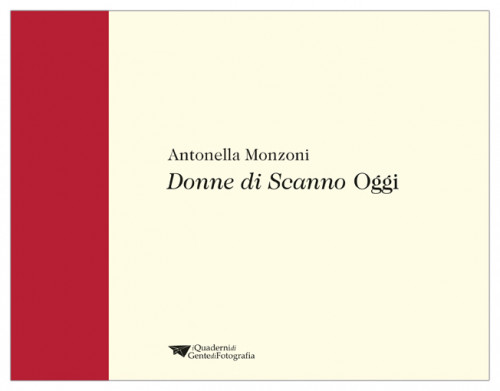Antonella Monzoni: Donne di Scanno Oggi

Pages: 64
Texts: Giovanni Bucci, Amedeo Fusco e Antonella Monzoni
Author: Antonella Monzoni
Format: 220x170 mm.
Binding: Hardcover
Languages: Italian/English
ISBN 978-88-95388-28-1
€ 10,00
At the end of the 1950s Giuseppe Turroni criticized bitterly the
photographs that Mario Giacomelli had taken at Scanno, defining them as
“the quintessence of southern rhetoric”. If the great critic were still
among us, he would certainly praise Antonella Monzoni’s portraits:
“Scanno’s women have finally been photographed without rhetoric”. No
more black skirts, but white coats to work in restaurants’ kitchens,
pharmacies, confectionery labs, bakeries, shops… The new Scanno’s women
draw cheques and settle invoices via the Internet with their own credit
card. They no longer balance on her heads baskets full of wood to stoke
the fireplace in view of a long cold winter with their shepherd husbands
away in Puglia. Time changes everything and the artist – Antonella
Monzoni in our case – often anticipates and bears witness to these
changes.
Yet you can sense a certain continuity in the eyes of these “new” women, a connection with those photographed by Hilde Lotz-Bauer, Cartier-Bresson, Giacomelli and many more.
According to Benedetto Croce’s notion of History, the past is linked to the present by an unbroken sequence of chained events. If you shake one end of the chain, the other will vibrate too. Antonella Monzoni’s photographs show this resonance. Her women no longer wear costumes, but they are like their grandmothers and great-grandmothers: strong and determined but also sweet and sentimental. You just have to read the faces captured by the photographer’s sensitive lens as well as the accompanying texts. Here is an illuminating example: “Scanno is a life choice (…). I have always felt strongly tied to tradition (…). At Beijing’s International Folklore Festival I felt like a queen in my traditional costume: it was my grandmother’s and I reassembled it piece by piece”.
Thanks to Antonella Monzoni’s “new” photographs, Scanno’s complex iconography has been enriched with the notion of “before” and “after”.
(Giovanni Bucci )
Yet you can sense a certain continuity in the eyes of these “new” women, a connection with those photographed by Hilde Lotz-Bauer, Cartier-Bresson, Giacomelli and many more.
According to Benedetto Croce’s notion of History, the past is linked to the present by an unbroken sequence of chained events. If you shake one end of the chain, the other will vibrate too. Antonella Monzoni’s photographs show this resonance. Her women no longer wear costumes, but they are like their grandmothers and great-grandmothers: strong and determined but also sweet and sentimental. You just have to read the faces captured by the photographer’s sensitive lens as well as the accompanying texts. Here is an illuminating example: “Scanno is a life choice (…). I have always felt strongly tied to tradition (…). At Beijing’s International Folklore Festival I felt like a queen in my traditional costume: it was my grandmother’s and I reassembled it piece by piece”.
Thanks to Antonella Monzoni’s “new” photographs, Scanno’s complex iconography has been enriched with the notion of “before” and “after”.
(Giovanni Bucci )
